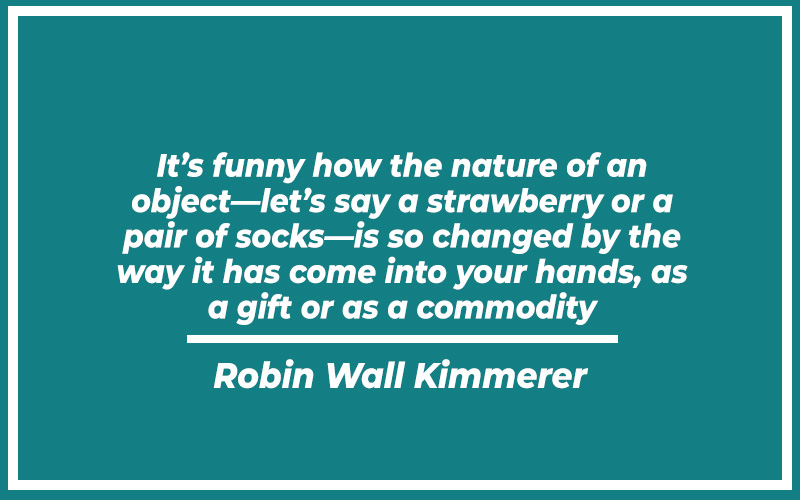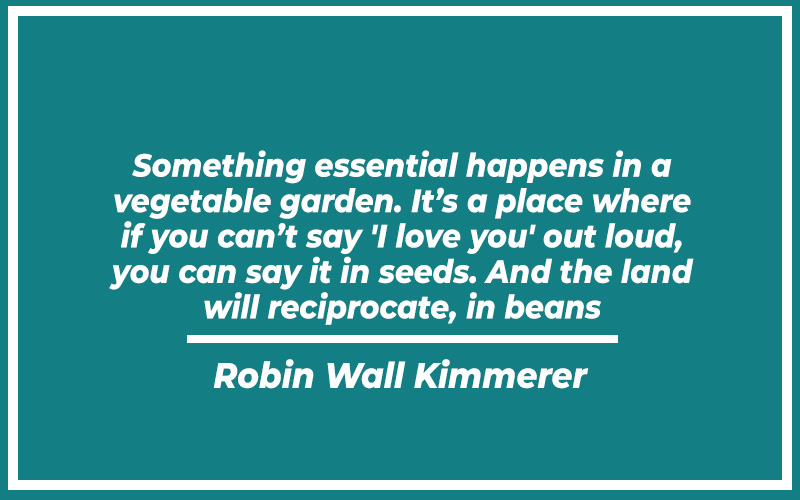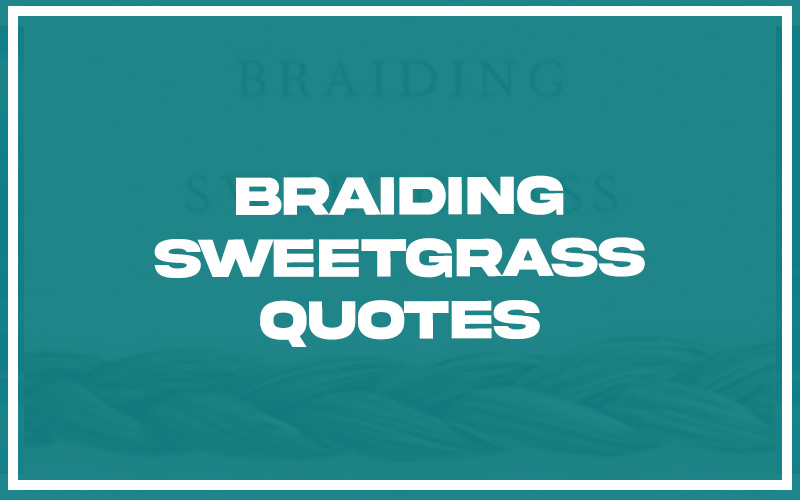If you’re someone who cherishes the rich textures of family and cultural heritage, then the evocative phrases found in “Braiding Sweetgrass” by Robin Wall Kimmerer will resonate deeply with you.
This book weaves together Indigenous wisdom, scientific knowledge, and the teachings of plants into a beautiful tapestry of stories that remind us of our connection to the natural world.
As you explore quotes from “Braiding Sweetgrass,” you’ll discover insights that celebrate the harmony between nature and humanity, urging you to consider the ways in which we give to and receive from the Earth.
Best Braiding Sweetgrass Quotes
“Knowing that you love the earth changes you, activates you to defend and protect and celebrate. But when you feel that the earth loves you in return, that feeling transforms the relationship from a one-way street into a sacred bond.” – Robin Wall Kimmerer
Robin Wall Kimmerer reflects on the reciprocity of love with the earth, suggesting that awareness of our love for the natural world compels us to act in its defense. This quote highlights a transformation in perspective—from viewing nature as something to benefit from, to engaging with it as a respected partner.
Kimmerer’s words encourage us to consider a deeper, reciprocal relationship with the environment, where mutual affection can lead to greater commitment to environmental stewardship.
Also Read: Vinland Saga Quotes (with Explanation)

“It’s funny how the nature of an object—let’s say a strawberry or a pair of socks—is so changed by the way it has come into your hands, as a gift or as a commodity.” – Robin Wall Kimmerer
This observation by Kimmerer explores the difference in our relationships with objects based on their origin—whether as a commercial transaction or as a personal gift. She posits that gifts carry a story and create bonds, while commodities might not engender the same sense of obligation or gratitude.
This distinction invites us to rethink our consumption habits and consider the deeper implications of how we obtain and value the things in our lives.
“The arrogance of English is that the only way to be animate, to be worthy of respect and moral concern, is to be human.” – Robin Wall Kimmerer
Kimmerer critiques the limitations of the English language, particularly its failure to recognize the animacy and agency of non-human entities. She suggests that other languages, including those of indigenous peoples, often recognize non-humans as living beings with rights and roles.
This quote challenges us to expand our moral and linguistic horizons to acknowledge and respect the agency of all beings in the ecosystem.
“What I do here matters. Everybody lives downstream.” – Robin Wall Kimmerer
Kimmerer emphasizes the interconnectedness of human actions and the environment, reminding us that our actions have downstream effects on others.
By acknowledging that what we do impacts others, she advocates for a mindful and responsible approach to how we interact with our surroundings, urging a consideration of the broader ecological community in our daily decisions.
“The land is the real teacher. All we need as students is mindfulness.” – Robin Wall Kimmerer
Here, Kimmerer personifies the land as a teacher, advocating for a humble and attentive approach to learning from our environment.
She encourages mindfulness as a way to open ourselves to the lessons offered by nature, suggesting that attentive presence in the natural world can provide profound educational and spiritual insights.
“Being naturalized to place means to live as if this is the land that feeds you, as if these are the streams from which you drink, that build your body and fill your spirit.” – Robin Wall Kimmerer
Kimmerer talks about the concept of becoming naturalized to a place, which involves a deep connection and commitment to the local environment.
This relationship is built on the understanding that our well-being is directly tied to the health of our surroundings. It calls for a life lived in acknowledgement of, and in harmony with, the natural world that sustains us.
“All powers have two sides, the power to create and the power to destroy. We must recognize them both, but invest our gifts on the side of creation.” – Robin Wall Kimmerer
This quote reflects on the dual nature of power, highlighting the responsibilities that come with it. Kimmerer urges us to acknowledge the capacity for both destruction and creation inherent in our actions and to choose paths that foster life and restoration.
This guidance encourages thoughtful consideration of the impacts of our choices and promotes a commitment to constructive and sustainable practices.
“Even a wounded world is feeding us. Even a wounded world holds us, giving us moments of wonder and joy. I choose joy over despair.” – Robin Wall Kimmerer
This quote by Robin Wall Kimmerer from “Braiding Sweetgrass” speaks to the resilience and generosity of the natural world, even when it is damaged or degraded. Kimmerer suggests that despite the harm we have inflicted on our environment, it continues to sustain and inspire us, offering beauty and moments of joy.
Her choice of joy over despair is an act of gratitude and recognition of the earth’s enduring gifts, urging us to reciprocate with respect and conservation.
“Paying attention is a form of reciprocity with the living world, receiving the gifts with open eyes and open heart.” – Robin Wall Kimmerer
Kimmerer emphasizes the importance of attentiveness as an act of exchange with nature, where paying attention is not just a passive act but a form of engagement that honors the natural world’s contributions to our lives.
This perspective fosters a deeper connection with our environment, encouraging us to appreciate and reciprocate the gifts we receive daily. It’s a call to be fully present in our interactions with nature, acknowledging that our awareness itself can be a gift back to the earth.
“We need acts of restoration, not only for polluted waters and degraded lands, but also for our relationship to the world.” – Robin Wall Kimmerer
In this quote, Kimmerer calls for restoration efforts that go beyond environmental cleanup to include mending our broader relationship with the earth. She highlights the need for a cultural and spiritual reconnection that respects and honors the natural world as a vital community member.
This holistic approach to restoration recognizes that healing the planet involves adjusting our attitudes and actions toward all living beings.
“To love a place is not enough. We must find ways to heal it.” – Robin Wall Kimmerer
Kimmerer challenges us to go beyond mere affection for nature to take active steps towards healing the environments we cherish. Loving a place involves responsibility—engaging in practical efforts to restore and preserve the vitality of these spaces.
This quote is a call to action, urging us to transform our emotional connections into protective and restorative actions.
“Joanna Macy writes that until we can grieve for our planet we cannot love it—grieving is a sign of spiritual health.” – Robin Wall Kimmerer
Reflecting on the thoughts of eco-philosopher Joanna Macy, Kimmerer discusses the importance of grieving for the environmental destruction we witness. She suggests that allowing ourselves to grieve demonstrates a deep connection to the earth and is a necessary step towards truly loving and caring for it.
This grieving process is seen as a healthy, natural response to loss, which can galvanize further action towards environmental conservation.
“Being naturalized to place means to live as if this is the land that feeds you, as if these are the streams from which you drink, that build your body and fill your spirit.” – Robin Wall Kimmerer
This quote stresses the importance of forming a deep, sustainable relationship with the local environment, suggesting that we should live as if our very lives depend on the health of our immediate natural surroundings.
Kimmerer encourages a sense of direct dependency and care for local ecosystems, urging us to consider them as vital to our physical and spiritual nourishment and to act accordingly in their preservation.
“The trees act not as individuals, but somehow as a collective. Exactly how they do this, we don’t yet know. But what we see is the power of unity. What happens to one happens to us all. We can starve together or feast together.” – Robin Wall Kimmerer
Kimmerer points to the interconnectedness observed in forest ecosystems, where trees operate not just as individuals but as part of a collective community that shares resources and communicates in ways we are only beginning to understand.
This observation serves as a metaphor for human communities, emphasizing that our survival and well-being are interconnected. Her words call for unity and mutual care, underscoring the idea that the health of one is linked to the health of all.
“Knowing that you love the earth changes you, activates you to defend and protect and celebrate. But when you feel that the earth loves you in return, that feeling transforms the relationship from a one-way street into a sacred bond.” – Robin Wall Kimmerer
Robin Wall Kimmerer emphasizes the transformative power of mutual love between humans and the earth. This quote underlines that the act of loving the earth compels us to protect and cherish it, but sensing the earth’s love in return deepens this into a profound, reciprocal relationship.
It suggests that when we experience the earth’s care for us, our interactions evolve from mere stewardship to a sacred and more deeply committed relationship.
“It’s funny how the nature of an object—let’s say a strawberry or a pair of socks—is so changed by the way it has come into your hands, as a gift or as a commodity.” – Robin Wall Kimmerer
Kimmerer reflects on how the value and significance of everyday objects can vary dramatically based on their context. A commodity purchased at a store carries different emotional weight than an item received as a gift, which may embody personal connections, memories, and gratitude.
This quote invites us to reconsider our relationship with material goods, suggesting a shift from seeing items merely as transactions to appreciating them as potential connections to others.
“The arrogance of English is that the only way to be animate, to be worthy of respect and moral concern, is to be human.” – Robin Wall Kimmerer
This quote critiques the English language for its limitations in acknowledging the life and agency of non-human entities. Kimmerer points out that many indigenous languages treat other beings, not just humans, as deserving of moral consideration.
This perspective challenges us to broaden our ethical considerations to include all forms of life, enriching our interactions with the natural world.
“What I do here matters. Everybody lives downstream.” – Robin Wall Kimmerer
Kimmerer uses this metaphor to highlight the interconnectedness of our actions with the broader environmental and community health.
The idea that “everybody lives downstream” serves as a reminder that our choices have impacts far beyond our immediate surroundings, advocating for responsible environmental stewardship.
“The land is the real teacher. All we need as students is mindfulness.” – Robin Wall Kimmerer
Here, Kimmerer suggests that the land itself offers invaluable lessons about life and our place within it.
The requirement for mindfulness indicates that an attentive, respectful approach is crucial to learning these lessons, emphasizing the importance of being present and receptive to the natural world’s wisdom.
“Being naturalized to place means to live as if this is the land that feeds you, as if these are the streams from which you drink, that build your body and fill your spirit.” – Robin Wall Kimmerer
Kimmerer discusses the concept of being naturalized to a place, which involves a deep, symbiotic relationship with the local environment.
This quote promotes a way of life that acknowledges and respects the sources of our sustenance and spirit, encouraging a life lived in harmony with and in acknowledgment of the natural world’s role in our existence.
“All powers have two sides, the power to create and the power to destroy. We must recognize them both, but invest our gifts on the side of creation.” – Robin Wall Kimmerer
This quote calls for a balanced understanding of our capabilities, recognizing that while we have the capacity for both destruction and creation, we should choose to use our abilities constructively.
Kimmerer encourages us to focus on nurturing and building rather than consuming or depleting, suggesting a path forward that is sustainable and life-affirming.
“Often in the Western world, kinship is thought of only as human relatives, but in many Indigenous worldviews, kinship includes plants and animals.” – Robin Wall Kimmerer
Robin Wall Kimmerer challenges the conventional Western notion of kinship in “Braiding Sweetgrass,” proposing a more expansive view that includes the natural world. By recognizing plants and animals as kin, Kimmerer encourages a deeper respect for and engagement with our environment.
This perspective fosters a sense of responsibility towards all forms of life, urging us to consider the broader implications of our actions on the ecosystem. Her words advocate for a relational approach that values all beings as part of an extended family.
“This seemingly trivial grammatical rulemaking in fact expresses deeply held assumptions about human exceptionalism, that we are somehow different and indeed better than the other species who surround us.” – Robin Wall Kimmerer
Kimmerer critiques the subtle linguistic cues in English that prioritize humans over other species, revealing a deep-seated bias towards human exceptionalism. She argues that this grammatical distinction reflects and reinforces a worldview that undervalues the more-than-human world.
By challenging these linguistic norms, Kimmerer invites us to reconsider our place within the natural world, promoting a more egalitarian and respectful relationship with other species. Her commentary highlights the power of language in shaping our perceptions and interactions with the environment.
“The flourishing was not from Skywoman alone but from the alchemy of all the animals’ gifts coupled with her deep gratitude. Together they formed what we know today as Turtle Island, our home.” – Robin Wall Kimmerer
Kimmerer recounts the creation story of Turtle Island, emphasizing the collective contributions and gratitude that shape our world. This narrative underscores the importance of reciprocity and thankfulness in fostering a healthy, vibrant ecosystem.
By highlighting the interconnectedness of all beings in this creation story, Kimmerer illustrates a model of coexistence that is based on mutual support and appreciation, challenging the often exploitative relationships humans have with nature.
“A garden is a nursery for nurturing connection, the soil for cultivation of practical reverence.” – Robin Wall Kimmerer
In this metaphor, Kimmerer views the garden as a space for cultivating deeper connections between humans and the earth. She suggests that gardening is not only about growing food but also about fostering a relationship of reverence and care for the land.
This act of gardening becomes a practice of attentive stewardship, where each act of planting and nurturing is a step towards greater ecological and personal health. Her perspective invites us to engage in gardening as a form of ecological spirituality.
“But the beauty of the partnership is that each plant does what it does in order to increase its own growth. But as it happens, when the individuals flourish, so does the whole.” – Robin Wall Kimmerer
Kimmerer highlights the symbiotic relationships within ecosystems, where individual plants contribute to the health of the whole community. This quote reflects the ecological principle that individual well-being is intrinsically linked to the well-being of the larger system.
By understanding and mimicking these relationships, humans can learn to create more sustainable and resilient communities. Kimmerer’s insight challenges us to rethink how we organize our societies, economies, and agricultural practices to mirror these natural systems.
“A gift creates ongoing relationship.” – Robin Wall Kimmerer
This simple yet profound statement encapsulates the philosophy of reciprocity that Kimmerer espouses throughout “Braiding Sweetgrass.” She argues that viewing exchanges with the natural world as gifts rather than resources changes the nature of the interaction, fostering ongoing relationships of care and responsibility.
This concept encourages a shift from exploitation to stewardship, urging us to consider the long-term implications of our take-and-take mentality and to adopt a more reciprocal, sustainable approach.

“Something essential happens in a vegetable garden. It’s a place where if you can’t say ‘I love you’ out loud, you can say it in seeds. And the land will reciprocate, in beans.” – Robin Wall Kimmerer
Kimmerer uses the vegetable garden as a metaphor for expressing love and care non-verbally through the act of planting. This quote emphasizes the communicative potential of gardening, where planting seeds is akin to a declaration of love for the earth—a sentiment that the earth returns through the production of food.
This reciprocal relationship enriches both the gardener and the garden, illustrating a model of interaction that is based on mutual respect and nourishment.
Also Read: Karma Liar Quotes (with Explanation)
Final Thoughts
Quotes from “Braiding Sweetgrass” are not just beautifully crafted words; they are invitations to embrace a more mindful and connected way of living. As you reflect on these insights, let them inspire you to cultivate a deeper respect for the land and its gifts.
Remember, each passage encourages a reciprocity with nature, where caring for the world is intertwined with our own well-being.
Let these quotes guide you to live in gratitude and harmony, just as sweetgrass braids togther strands of knowledge and understanding.

